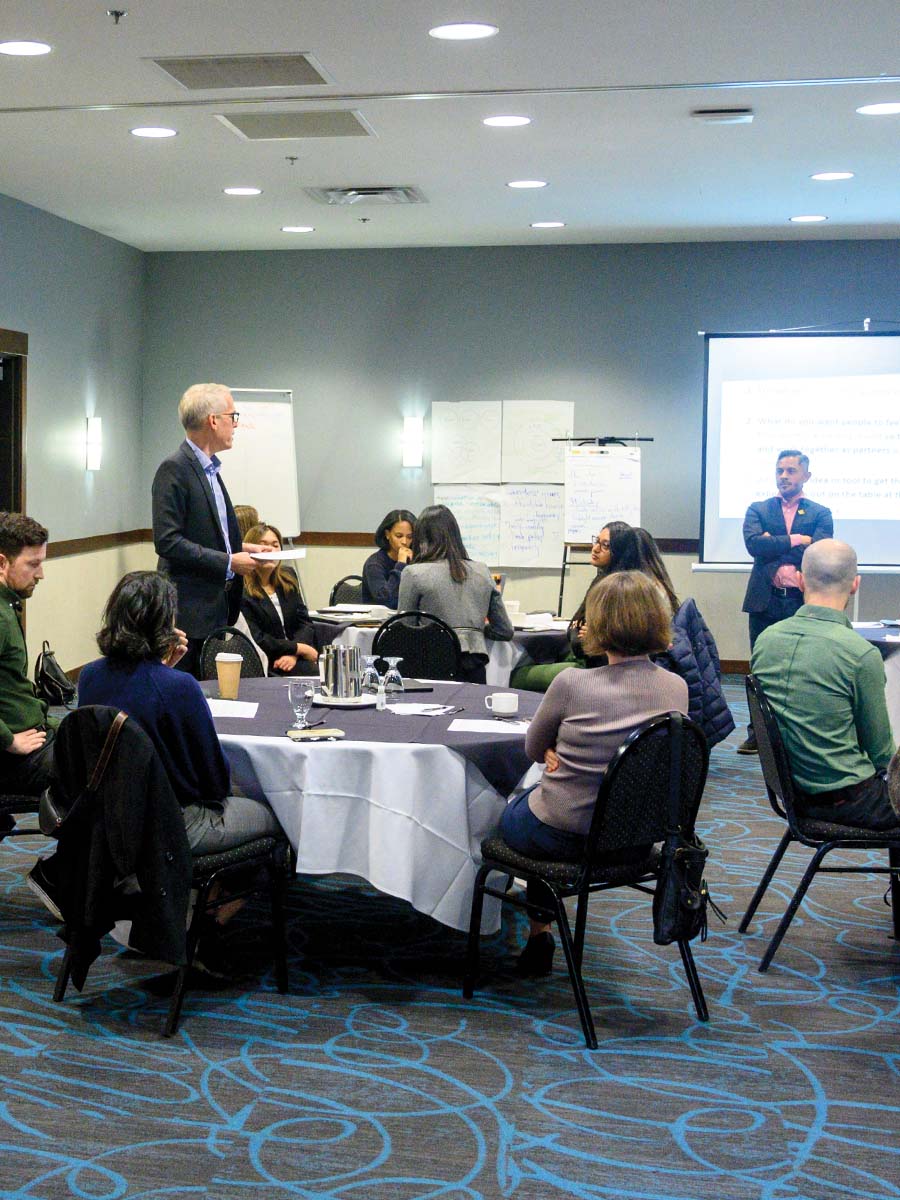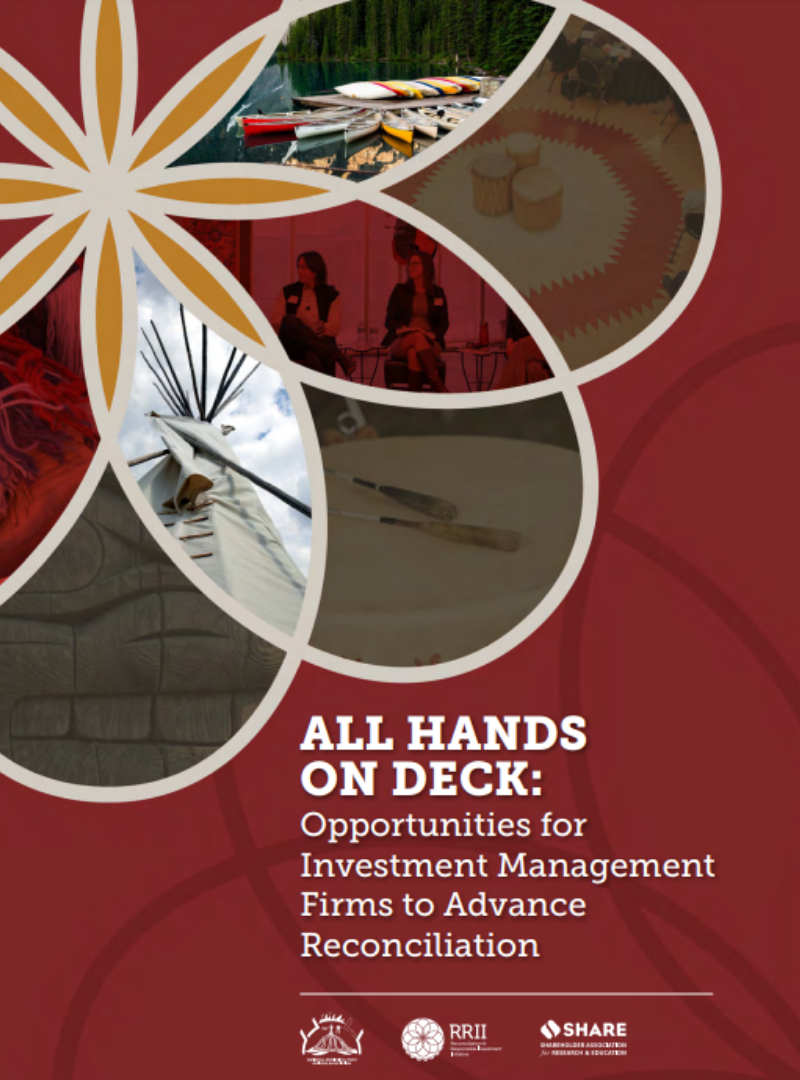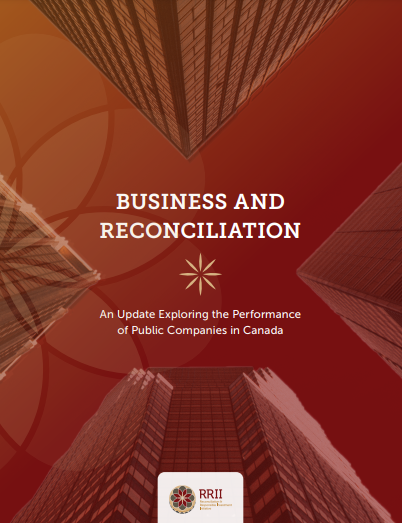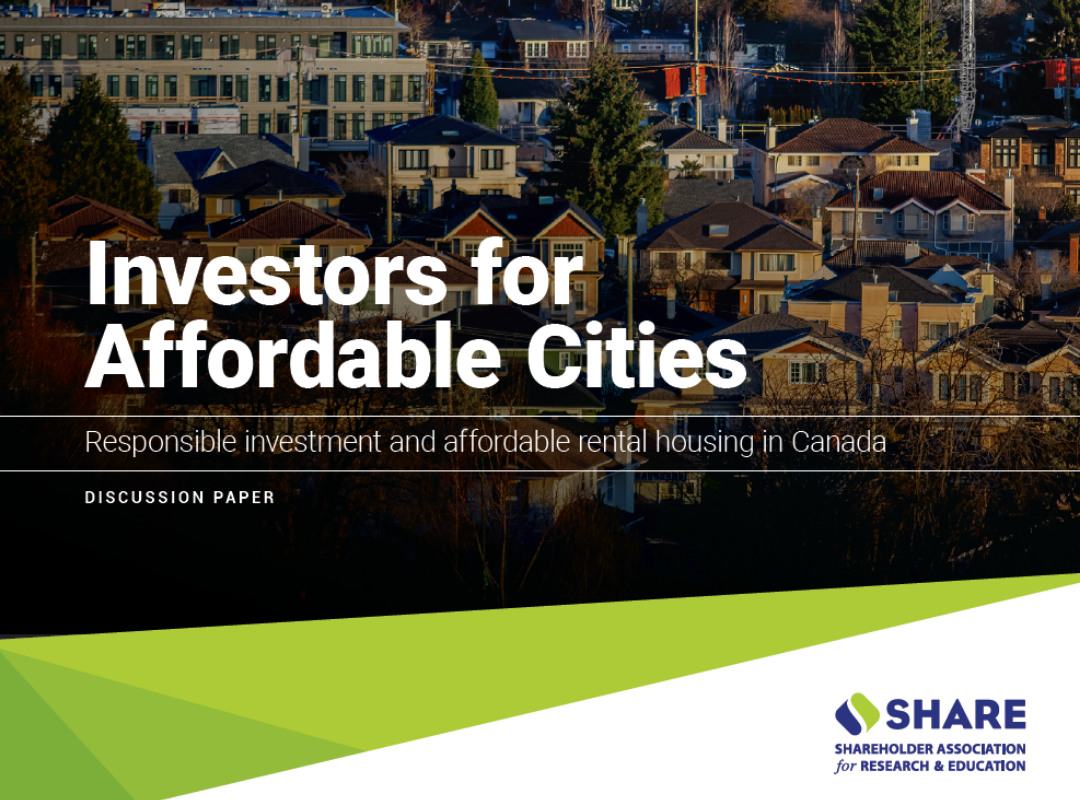rising

With the clouds of the pandemic beginning to clear, we are confronted with a vast range of social, environmental, and economic challenges. Now more than ever, the world is being called to action to address escalating wealth inequality, the global climate crisis, and a history of systemic racism.
This is a summit we cannot
climb alone.
In 2021, we built powerful partnerships, working alongside investors and community mobilizers to create purposeful and sustainable solutions to some of society’s most pressing issues. Our diverse network of foundations, asset managers, universities, pension funds, Indigenous trusts, and religious investors are working together with SHARE to shift power and develop practical strategies for investor action.
Whether through the Committee on Workers’ Capital, where we saw pension funds advocating to asset managers to uphold workers’ rights, or the Reconciliation and Responsible Investment Initiative (RRII) mobilizing institutional investors to advance reconciliation, or Climate Engagement Canada (CEC) and the University Network for Investor Engagement (UNIE) driving dialogues to promote a just transition, our progress is built on collaboration between the many partners in our network.
But investors will not be successful in addressing these challenges if they act alone.
That is why SHARE’s model puts the views, concerns and leadership of those that have traditionally been excluded from financial and economic decision-making at the centre of those decisions. In turn, the investor actions that we initiate and coordinate are designed to support those priorities and drive systemic change.
In this year’s annual report, learn more about how we are rising to the challenge and the tangible outcomes of our efforts. Alongside the leadership of our staff, board, partners and allies, we have the opportunity to create a thriving economy that works for everyone.
Signed,
The SHARE Team
“Our work isn’t about insulating ourselves and our investment portfolios from the risks our societies face. That kind of thinking has only increased the massive divide between those making economic decisions and those who have to live with the fallout from those decisions. Rather, our work is about using our power as economic actors to contribute to systemic solutions, so none of us have to face those risks alone.”
– Kevin Thomas, CEO

ANSWERING THE CALL
In 2021, we continued to answer the call to advance decent work and human rights, amplifying the efforts of on-the-ground movements and advocating for system-level changes.
In 2020, we began to research the impacts of COVID-19 on the working conditions of custodial and cleaning staff working at properties owned by institutional investors. In Spring 2021, a group of contracted cleaners at a mall in B.C. voted to unionize to secure decent wages and working conditions, and stronger health and safety provisions. When the employer refused to bargain in good faith, the Canadian Capital Stewardship Network (CCSN) was able to facilitate connections with pension plan trustees and the asset manager that owned the mall, to encourage the employer to respect the collective bargaining process. By emphasizing that decent work was core to the responsible investment policies of their respective plans, the trustees were able to support the workers in breaking the impasse and signing their first collective bargaining agreement.
The pandemic also uncovered the challenging working conditions facing home care workers across the country, such as those employed by Chartwell Retirement Residences. Together with the Institute of the Blessed Virgin Mary Foundation, SHARE filed a shareholder proposal at Chartwell, advocating for improved working conditions. The proposal received 31% of the vote, and we continue to engage with the company on next steps.
In addition, we advanced decent work and human rights engagements with Dollarama, Amazon, Google Alphabet, Life Labs and others, held trustee consultations through the CCSN, helped secure 14 signatories to the International Accord for Health and Safety, and advocated for new laws on supply chain human rights due diligence in a joint open letter to G7 leaders and regular meetings with government leaders in Canada.
By Sarah Couturier-Tanoh and Jacob Leibovitch
WATCH: Voting for a just recovery, CCSN
READ: Google-Alphabet Shareholders file 11 Proposals for the 2022 Proxy Season Citing a Range of Human Rights and Governance Risks, Investor Alliance for Human Rights
REACHING NEW HEIGHTS
The past two years have had an undeniable impact on the way the world sees reconciliation and racial equity.
In 2021, our work took its next steps towards change by translating momentum for reconciliation and racial justice into tangible actions.
Last year, the award-winning Reconciliation and Responsible Investment Initiative (RRII), hosted by SHARE and NATOA, updated its research on reconciliation-related corporate disclosures in its report Business and Reconciliation. RRII also published a framework for investment management firms looking to uphold Indigenous rights recognition and advance reconciliation. The report, All Hands on Deck, includes examples and testimonials from 48 Canadian investment managers and advisors.
Beyond developing frameworks and toolkits, SHARE and our partners also advocated for tangible next steps for reconciliation by Canadian corporations. On behalf of the Atkinson Foundation, SHARE filed a proposal for Indigenous inclusion and reconciliation at TMX Group. The proposal passed with support from the company’s board and an overwhelming majority of shareholders, making history as one of the first reconciliation votes at a public company. While this was an important win for SHARE, the Atkinson Foundation, and TMX shareholders, this vote and its reception would not have been possible without the leadership and collaboration of the Canadian Council for Aboriginal Business (CCAB), whose influential team has worked with TMX Group to build a forward-looking plan for reconciliation.
Two additional engaged companies committed to the CCAB’s Progressive Aboriginal Relations certification in 2021, and SHARE filed a similar shareholder proposal at four additional companies in late 2021, to be considered in the 2022 proxy season.
In addition, we led a series of engagements with 45 companies across sectors on investor expectations around racial justice and equity, including board diversity, racial pay equity, Indigenous representation, workforce disclosure, and racial discrimination and biases in products and services. Some of these engagements have resulted in real action from companies to address gaps in their racial equity frameworks and strategies. For example, following SHARE engagement, InterRent REIT’s first sustainability report, published in December 2021, addressed almost all of SHARE’s recommendations, including disclosing data on the racial and ethnic composition of the company’s workforce and exploring racial and gender pay equity analyses.
There is still more to be done as we help companies move from commitment to action. We are connecting with more racial equity and reconciliation experts to help shape our approach to this work, and working with multiple philanthropic foundations and universities to advance racial justice efforts and outcomes by Canadian investment managers.
By Joseph Bastien and Juana Lee

BUILDING A MOVEMENT
As investors and movements look to SHARE for support, we are building new networks of changemakers to provide meaningful and effective pathways for collective action.
Launched in March 2021, the University Network for Investor Engagement (UNIE) was designed to support Canadian universities as they work to accelerate the transition to a low carbon economy. In just one year, the network has brought together 15 universities across Canada to engage in climate dialogues with companies in their investment portfolios to decarbonize the economy.
In October 2021, SHARE, together with the Responsible Investment Association (RIA), Ceres, and Principles for Responsible Investment (PRI), launched Climate Engagement Canada (CEC), Canada’s first finance-led engagement program focused on accelerating a just transition to a net zero economy. Alongside the RIA, SHARE hosts the CEC’s secretariat, providing training and leading engagement with 40 of Canada’s largest emitting companies for 29 investors (with over $3.6 trillion in assets under management).
SHARE’s CEO was appointed Co-Chair of the international Investors for Opioid and Pharmaceutical Accountability (IOPA) coalition, bringing together 63 institutions with more than $4.2 trillion in assets to focus collective advocacy on changing governance and oversight of the global pharmaceutical sector and its outsized influence on health outcomes and health policy around the world.
The Global Union’s Committee on Workers’ Capital (CWC)—whose secretariat is based at SHARE—has grown its Asset Manager Accountability Initiative, convening asset owner board members and clients of BlackRock, State Street and UBS Asset Management in collaborative engagements on workers’ rights in investment stewardship. Through this model of collective action, trustees from health care, construction and teacher boards can amplify their demands, and work together to shift the balance of power in the investment chain. This work will continue into 2022 with the launch of the CWC’s Baseline Expectations of Asset Managers on Freedom of Association and additional engagements involving its growing trustee network.
By Omar Dominguez and Shalini Ramgoolam
DISCOVER: University Network for Investor Engagement (UNIE)
DISCOVER: Climate Engagement Canada (CEC)
READ: Asset Manager Accountability Reports, CWC
NO ONE LEFT BEHIND
Any serious effort to build a sustainable, inclusive and productive economy cannot fail to address growing economic inequality, including housing affordability.
This past year, alongside the Catherine Donnelly Foundation and Vancouver Foundation, we launched our inaugural research on affordable housing as an investor issue. In Investors for Affordable Cities, we take a look at the financialization of housing, how investors have played a role in the housing crisis in Canada, and options for addressing housing affordability in investment portfolios.
In addition, we hosted an accompanying webinar that brought housing advocates, academics, policy analysis and investors to discuss how investor leadership and decision-making can have an impact on the future of housing affordability. As the housing crisis deepens, we will be expanding this work and connecting with a range of institutional investors across Canada that want to contribute to housing affordability, not housing crises.
By Tamara Herman and Gabriela Ruiz
BACK AT BASECAMP
In 2021 and through early 2022, SHARE welcomed new staff members, expanding our Vancouver and Toronto offices.
We are also thrilled to share that we now have staff in Montreal, where our team has the opportunity to connect with our many Quebec-based and Francophone clients and partners, as well as our peers at our sister organization Groupe Investissement Responsible (GIR), who host the only Canadian-owned proxy voting service.
We are also excited to usher in a new Co-Chair structure to our Board, with Leslee White-Eye and Colette Murphy as our new Co-Chairs, and to welcome our new Board member, Odrey Robillard.
We are thankful for the incredible service of our outgoing Chair, Mario Tremblay, who led our board through a period of substantial growth and change.
We look forward to the next year and where this new growth will take our networks. To learn more about upcoming career opportunities with SHARE, visit our Careers page or get in touch.
For more information about our services and investor initiatives, visit our website, subscribe to our mailing list, or send us an email to learn more.










